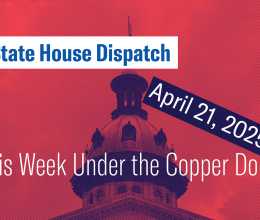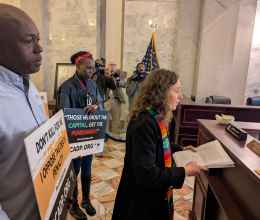In October of 2017, the ACLU of South Carolina filed a lawsuit against the City of Beaufort and Town of Bluffton as a result of municipal courts throughout the state, Beaufort and Bluffton included, sentencing defendants to jail time for low-level crimes without legal counsel. In South Carolina, municipalities are offered the option to create municipal courts which hear low level misdemeanor and traffic violations, often at high volume. 212 out of 270 cities in South Carolina have chosen to create municipal courts. These courts are able to, and often do, sentence defendants to jail time.
The three plaintiffs, Tina Bairefoot, Dae’quandrea Nelson, and Nathan Fox, were all accused of low-level offenses and were sentenced to jail time without ever receiving legal counsel. Ms. Bairefoot was accused of shoplifting a dog collar, candy bars, and hair products worth less than $200 from Walmart and was given a 30-day sentence in Beaufort County Detention Center. Mr. Nelson was charged with disturbing the schools and assault and battery third degree after participating in a fight in a school hallway and served 14 days in jail. Mr. Fox pled guilty to 5 traffic-related offenses, including a charge of speeding less than ten miles over the speed limit, and received a sentence of 50 days in jail. Each defendant never spoke to a lawyer from the time of first appearance in court to incarceration and was not advised of their right to counsel.
Not providing or informing defendants of their right to legal counsel is a violation of defendants’ constitutional rights. The Sixth Amendment guarantees a right to counsel, which was violated by the court’s refusal to provide a public defender or inform defendants of their right to one. Additionally, Beaufort municipal courts violated the Fourteenth Amendment right to equal protection under the law. Because the defendants could not afford a private attorney, the court had an obligation to provide legal assistance to ensure that their right to equal standing and treatment within the criminal justice system was met.
Why this case?
The court’s routine denial of the constitutional right to legal counsel disproportionately affects low-income defendants. It interferes with their ability to interact with the courts in an equal manner to their wealthier counterparts who can afford private legal counsel. This practice not only violates the Sixth and Fourteenth Amendments but also is representative of structural flaws in how justice is administered on the local level. Addressing this inequity is a step in addressing overt and implicit wealth-based discrimination within the justice system and defending the right to counsel as a guarantee for all, not a privilege for some.
The latest
In October of 2019, a settlement agreement was reached determining that municipal courts must appoint a public defender to all defendants who face the possibility of jail time. Per the settlement, the courts agreed to implement new court procedures to safeguard these constitutional rights. These include mandatory trainings related to the right to counsel and mandatory oral and written advisement to the defendants of their rights.
However, in September 2023, the ACLU of South Carolina filed a motion to enforce the 2019 settlement after the Town of Bluffton failed to clearly and consistently inform defendants of their rights to counsel. As a result, few public defenders were appointed, and low-income defendants in Bluffton were once again navigating the legal system without representation, leaving them at risk of unjust incarceration. In December of 2023, Bluffton agreed to distribute to all defendants entering the courthouse a written advisement of their rights to counsel in addition to requiring the judge to orally advise defendants of the same. Reinforcing the necessity of intentional and direct advisement of rights to defendants, this case highlights the need for ongoing vigilance to ensure that constitutional rights are upheld in every courtroom.







